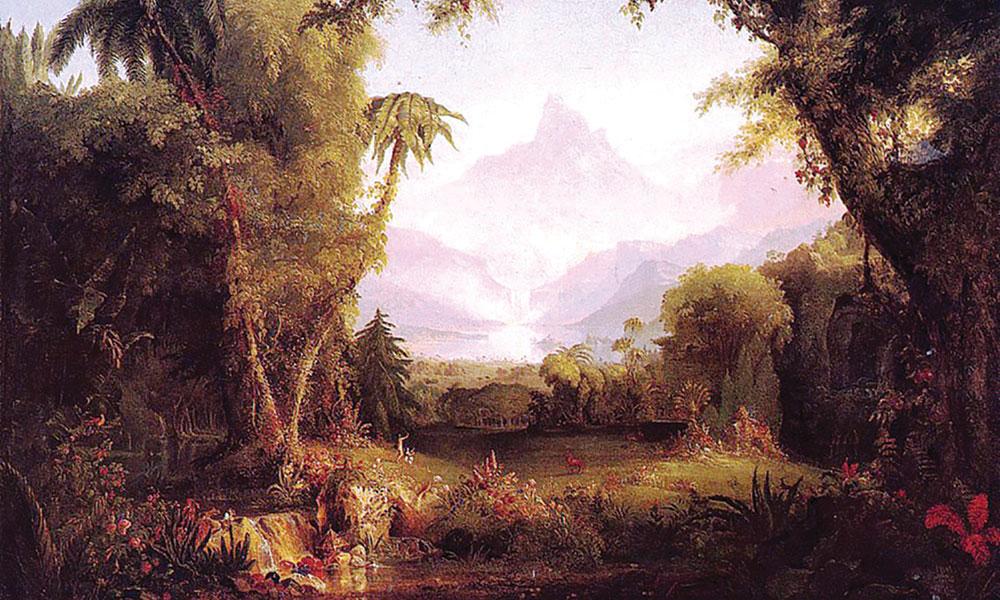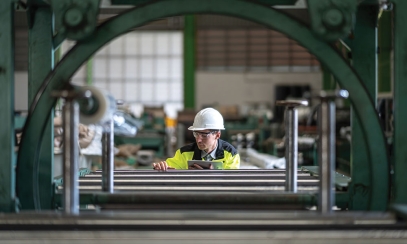
The Eucharist in Salvation History
Our God is a Trinitarian communion: Father, Son and Holy Spirit. Wondrously, the Father created us to share in this eternal communion. We know this as the plan of salvation. Of course, it might be better termed the drama of salvation.
Our God is a Trinitarian communion: Father, Son and Holy Spirit. Wondrously, the Father created us to share in this eternal communion. We know this as the plan of salvation. Of course, it might be better termed the drama of salvation.
The two paths
In the story of the Garden of Eden, God told our first parents that they could eat from any tree in the garden except for the Tree of the Knowledge of Good and Evil – for to eat its fruit meant death. Initially, they heard God’s command, believed God’s word and, consequently, lived in obedience to it. The result was that the invisible, true reality of abundance and fullness of life that accompanies life in communion with God became visible in the garden. It was paradise. They lived a good life, indeed.
Then, the serpent entered the picture. His message directly contradicted God’s word. If you eat from the forbidden tree, “You certainly will not die! God knows well that when you eat of it your eyes will be opened and you will be like gods, who know good and evil.” (Gn 3:4-6)
The rest is history. Our first parents heard the word of the serpent, believed it over the word of God and acted in obedience to this belief. They suddenly saw an invisible lack and acted upon this belief, thinking they could fill it of their own accord – which is the very essence of the “fall.” The result was the expulsion from paradise and death. The invisible and false reality of lack likewise became visible through the “fall,” and the fullness of life in communion with God was ruptured.
The way back
Of course, the Father’s plan was not going to be frustrated by our poor decision-making. God would do for us what we could not do for ourselves. The Father sent the Son to make possible our communion with God the Father, through the power of the Holy Spirit.
Jesus showed us what it meant to be of the same mind, heart, love and thought of the Father through his every word and action. In moments of temptation, adulation, abandonment and condemnation, Jesus remained obedient and dependent on the Father.
However, Jesus not only modeled communion for us, he made it possible for us to live into this communion. As Bishop Robert Barron of the Archdiocese of Los Angeles teaches, turning back to God is always a painful thing because of sin. For this reason, in the ancient world, there was no reconciliation with God without sacrifice. In the Old Testament, this sacrifice happened in the Jewish temple and was effected by the sacrifice of animals. Jesus, as the new temple, offered up his body and poured out his blood on the cross, taking upon himself the sins of the world – of all that separated us from communion with God – to bring about the reconciliation of the divine and human. In doing so, he saved us.
The Holy Spirit now dwells in the Church and in our hearts to help us live as Jesus lived, to act as Jesus acted and to join our sufferings to the sufferings of Christ for the salvation of all. In this way, all may be one in communion with God.
The Eucharist as sacrifice
The celebration of the Eucharist at Mass continues Christ’s sacrifice on the cross. It is not simply a memorial or an offering of praise and thanksgiving to God. According to the Compendium of the Catechism of the Catholic Church (271), the “Eucharist is the very sacrifice of the Body and Blood of the Lord Jesus instituted to perpetuate the sacrifice of the cross” through time until his return.
The same Jesus Christ who offered himself on Calvary now offers his body and blood on the altar. The same Jesus Christ who said only what he heard from the Father and who did only what he saw the Father do in perfect obedience now surrenders himself freely to the Father’s will at Mass for the glory of the Father, and for the remission of our sins. In doing so, Jesus Christ reaffirms that he is the Way, the Life and the Truth. He is the heart of that communion for which we are made. He is the “way back” to paradise through the power of the Holy Spirit.
When we receive the Eucharist, we literally take in and assimilate Christ’s body and blood, by which the world is continually reconciled. In the sacramental form of the Eucharist, we are invited to participate in Christ’s saving sacrifice.
For Further Reflection
Consider the following passage:
Those passing by reviled him, shaking their heads and saying, “You who would destroy the temple and rebuild it in three days, save yourself, if you are the Son of God, [and] come down from the cross! Likewise the chief priests with the scribes and elders mocked him and said, “He saved others; he cannot save himself. So he is the king of Israel! Let him come down from the cross now, and we will believe in him. He trusted in God; let him deliver him now if he wants him. For he said, ‘I am the Son of God.’” (Mt 27:39-43)
1. What does this passage suggest about the extent to which we are called to believe, obey and depend upon the Word of God?
2. Many today “demand a sign” when it comes to believing in the real presence of Christ in the Eucharist. What might this passage have to say about such demands?
3. How might this passage help you deepen your understanding of the Eucharist as a sacrifice?



